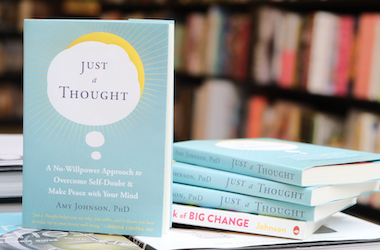“Your goals minus your doubts equal your reality” – Ralph Marston
In graduate school I studied the way information is mentally represented. How concepts are stored and processed and retrieved. I’m actually going to put that knowledge to use here because the way you mentally represent your dreams and your doubts is important.
It says a lot about whether your doubts impact your dreams. Every dream comes with its own set of doubts. So while banishing all doubt isn’t a reasonable objective, keeping your dream separate from your doubts is a brilliant idea and a very worthy goal.
Let’s say you want to scale the Eiffel Tower. Or win the Heisman Trophy. You have a lot of thoughts about your goal, many of which are really positive. You have your passion for the cause. Your fantasies of making it to the top or hearing your name called. The encouragement you’ve received from others. You have memories of having practiced your craft and done really well—those moments when you’re in flow and success seems inevitable.
All of that mental content is gold. It gets you pumped up and fuels your passion. Spending time focusing on that cerebral ball of good stuff launches you straight toward success.
You also have some doubts. The practice sessions that didn’t go so smoothly. That look you get from skeptics. Memories of watching your competition outperform you on the field or the image of the ground 1000 feet below you that’s burned into your mind. Your own doubts and fears will float in and out of your mind, oh…about a gazillion times a day. That’s all perfectly human.
The trick is keeping your dream and your doubts separate. Keeping them separate is how they can each be what they are and do what they do without your doubts bleeding all over your dreams.
How do you keep them separate? Think of them independently. And speak about them as independent and separate. Label your dream your dream, and your doubts your doubts.
Instead of saying “I’d love to win the Heisman but I’m on a crappy team”—which implies that the doubts (crappy team) have something to do with the dream (win the Heisman)—say “I’d love to win the Heisman. I also happen to be on a crappy team.”
Being on a crappy team is a perceived obstacle but if you’ve learned anything in this book so far it’s that perceptions aren’t always accurate. You have doubts about your ability to win the Heisman and it may be a fact that your team sucks, but those don’t necessarily negate your goal.
One thing is for sure: if you assume the crappy team destroys your chances at the Heisman, it does. I can pretty much promise you that.
And same for La Tour Eiffel…you have your dream of reaching the top, and then you have your doubts about not breaking your neck. So keep them separate. On the one hand, your training has shown you that you can scale large structures with amazing skill and ease. On the other hand, you’re scared. Both are fine, just keep them independent. The fear doesn’t negate the dream. It actually doesn’t mean anything about the dream—it just means you feel fear.
When you picture yourself falling to your death, remember that’s just a scary image your mind created. Obviously let it encourage you to take precautions to avoid that outcome, but that doesn’t require replaying the fear over and over. It just requires taking safety seriously.
Once you’ve used the fear to prepare yourself the best you can, then it’s time to filter out that fear when it comes around. Stash it away in the “doubts” box in your mind. See it, acknowledge it, and then store it in the “doubts” bin and put a lid on it. And don’t let it play with anything in the “dream” bin.
The more you can come to think, “This is my dream and those are my doubts”, rather than “This is my dream but these are my doubts”, the cleaner and prettier your dream will be.






